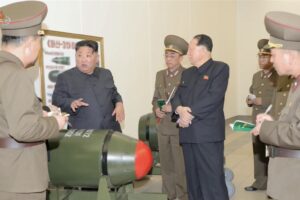A tepid response from Washington to North Korean aggression has led to additional attacks by convincing Pyongyang that American threats aren’t to be taken seriously.
So argues Van Jackson of the Asia-Pacific Center for Security Studies in his book Rival Reputations: Coercion and Credibility in U.S. North Korea Relations. He demonstrates that a series of incidents that were followed up by the U.S. backing down, and with one incident that did result in a show of force – Operation Paul Bunyan following the notorious 1976 ax murder incident in Panmunjom – resulted in fewer acts of violence against American personnel.
A tepid response from Washington to North Korean aggression has led to additional attacks by convincing Pyongyang that American threats aren’t to be taken seriously.
So argues Van Jackson of the Asia-Pacific Center for Security Studies in his book Rival Reputations: Coercion and Credibility in U.S. North Korea Relations. He demonstrates that a series of incidents that were followed up by the U.S. backing down, and with one incident that did result in a show of force – Operation Paul Bunyan following the notorious 1976 ax murder incident in Panmunjom – resulted in fewer acts of violence against American personnel.
Try unlimited access
Only $1 for four weeks
-
Unlimited access to all of NK News: reporting, investigations, analysis
-
Year-one discount if you continue past $1 trial period
-
The NK News Daily Update, an email newsletter to keep you in the loop
-
Searchable archive of all content, photo galleries, special columns
-
Contact NK News reporters with tips or requests for reporting
Get unlimited access to all NK News content, including original reporting, investigations, and analyses by our team of DPRK experts.
Subscribe
now
All major cards accepted. No commitments – you can cancel any time.










